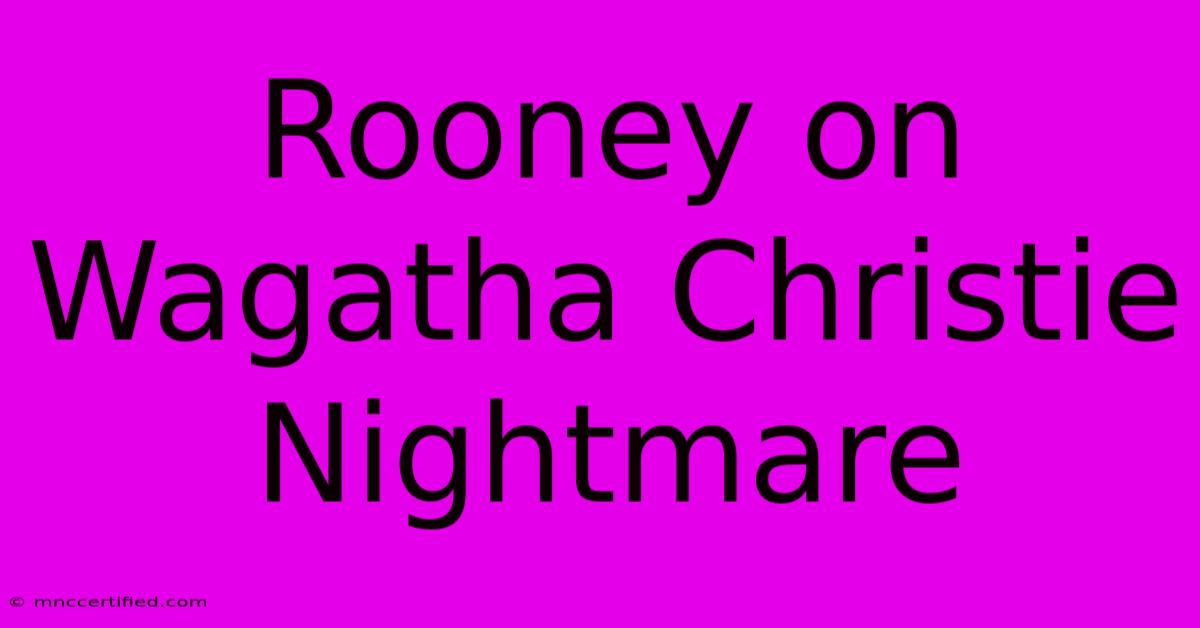Rooney On Wagatha Christie Nightmare

Table of Contents
Rooney on Wagatha Christie Nightmare: A Deeper Dive into the Fallout
The "Wagatha Christie" trial captivated the world, pitting Rebekah Vardy against Coleen Rooney in a high-profile libel battle. While the legal proceedings themselves were dramatic, the aftermath, particularly Coleen Rooney's perspective and the ongoing impact on both women, continues to fascinate. This article delves into the lingering effects of the case, focusing specifically on Coleen Rooney's experience and how she navigated the public and media scrutiny.
Coleen Rooney's Perspective: Beyond the Verdict
The "Wagatha Christie" verdict saw Rebekah Vardy lose her libel case against Coleen Rooney. However, the victory wasn't without its complexities. Coleen, often portrayed as the wronged party, faced intense media pressure and public opinion, navigating a landscape of intense scrutiny. Understanding her perspective requires looking beyond the headlines and examining the emotional toll of the ordeal.
The Public Eye and Media Scrutiny
The trial generated immense public interest, transforming Coleen Rooney from a football wife into a household name. She became a subject of intense media scrutiny, with every statement and action analyzed and dissected by the press. This constant pressure, even after the verdict, undoubtedly contributed to the ongoing “Wagatha Christie” narrative. The relentless attention forced her to remain vigilant about her public image and personal life, a burden few can comprehend.
The Emotional Cost
Beyond the public glare, the emotional toll on Coleen cannot be underestimated. The trial involved intensely personal details of her life, exposing vulnerabilities and dredging up painful memories. This intrusion into her private life, regardless of the outcome, carries significant emotional weight. The experience likely left lasting impacts on her sense of privacy and security.
Navigating Public Opinion
Even with a court victory, Coleen had to contend with varied public opinions. While some supported her fiercely, others criticized her actions or questioned her motives. Successfully navigating such divided opinions requires resilience, strategic communication, and a clear understanding of the public narrative. It highlights the complexities of dealing with public perception, even in a seemingly clear-cut case.
The Lasting Impact of Wagatha Christie
The "Wagatha Christie" saga extends far beyond the courtroom. Its impact continues to resonate in various aspects:
The Media Landscape and Celebrity Culture
The case highlighted the intense scrutiny faced by celebrities, particularly within the often-ruthless realm of social media. It spurred conversations about privacy, the ethics of media reporting, and the power dynamics inherent in celebrity culture. The trial's widespread coverage served as a stark reminder of the potential consequences of social media interactions and the relentless pursuit of celebrity news.
Legal Precedents and Future Cases
The "Wagatha Christie" trial might set legal precedents for future libel cases involving social media and celebrity disputes. Its intricate details and the legal arguments presented could inform future litigation, influencing how similar cases are approached and resolved.
The Public's Fascination with Celebrity Feuds
The enduring public interest in the "Wagatha Christie" saga showcases a broader fascination with celebrity feuds and behind-the-scenes drama. This fascination underscores the public's desire for insight into the lives of famous individuals, often fueled by the allure of conflict and scandal.
Conclusion: Moving Forward from the Nightmare
Coleen Rooney's experience with the "Wagatha Christie" nightmare serves as a compelling case study of navigating intense public scrutiny and the emotional complexities of a high-profile legal battle. While the verdict brought a degree of closure, the long-term effects are still unfolding. Her resilience in facing the media storm and navigating the aftermath highlights the strength and perseverance required in such a challenging situation. The case itself remains a significant moment in contemporary celebrity culture, raising important questions about privacy, media ethics, and the enduring power of public fascination.

Thank you for visiting our website wich cover about Rooney On Wagatha Christie Nightmare. We hope the information provided has been useful to you. Feel free to contact us if you have any questions or need further assistance. See you next time and dont miss to bookmark.
Featured Posts
-
Donate Blood Chiefs Week
Nov 19, 2024
-
Attorney To Sue Insurance Company
Nov 19, 2024
-
Actor Paul Teal One Tree Hill Dies Aged 35
Nov 19, 2024
-
Giants Bench Jones Next Steps
Nov 19, 2024
-
Coleen Rooney Wagatha Christie Trial
Nov 19, 2024